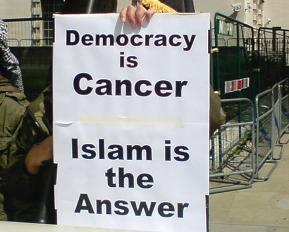
Speaking to an overflow crowd at the University of Michigan in Ann Arbor, noted Muslim scholar Tariq Ramadan criticized extreme Islamists known as Salafis, saying that the Arab world needs to develop political systems that reject both theocracies and dictatorships.
But he added that Arab countries should develop their societies in ways that are unique to their own cultures.
"Every single country should find its own way," Ramadan said to a crowd inside a classroom at the university's law school. "We can't impose models" on the Arab world from the West and elsewhere.
Ramadan, who teaches at Oxford University in England, is the grandson of the founder of the Muslim Brotherhood, the group that took power in Egypt this year after the Arab Spring and democratic elections. Ramadan was born in Europe because his father, a Brotherhood leader, was forced to flee Egypt at a time when it was cracking down on the Islamist group. Ramadan believes that Islam and democracy are compatible.
In his talk, Ramadan slammed politicians -- whether Salafis in Egypt or the Tea Party in the U.S - that he said played to emotions instead of reason.
"Democracy is about critical thinking," not fear and emotions, Ramadan said. "Populism is a danger, a universal danger," including religious populism.
Ramadan also criticized the Arab world for its poor record of educating women and its divisions. He said there's a "polarization between secularists and Islamists" in the Middle East that can't be blamed on the West. He also bemoaned divisions between Sunnis and Shias, the two main sects within Islam.
"I was shocked" at a recent meeting with Sunni leaders when I heard some of their anti-Shia rhetoric, he said.
Ramadan, who has lived his entire life in Europe, also told the Muslim crowd that they should not just talk about their rights, but also meet their "responsibilities towards the community."
At the same time, they shouldn't "have to apologize for being Muslim." He criticized Muslims who were embarrassed to use Islamic terminology in public. "Jihad is not a dirty word," referring to a Muslim world for struggle. "Sharia is not dirty word," he added referring to a Muslim world for Islamic law or code.
Regarding the Arab Spring, Ramadan said it was good to see dictators being overthrown, but he cautioned that outside powers in the West, China, and other countries are playing roles in the Middle East for their own "economic and geostrategic interests."
Ramadan's talk Monday night was his first he's given in Michigan since he spoke in Dearborn in 2010. In 2004, Notre Dame University offered Ramadan a teaching position, but he couldn't accept it because he was banned by the Bush administration from entering the U.S. for six years for alleged ties to terrorists, a claim Ramadan has said was baseless. In Jan. 2010, Secretary of State Hillary Clinton lifted the ban on Ramadan.
In an interview with the Free Press after his talk, Ramadan said of the Palestinians: "The situation is worse, and it's worsening. I really don't see any positive." He also said the Arab world can't blame the West for its failure to create better educational and intellectual institutions.
"We can't blame the West for our failures."



